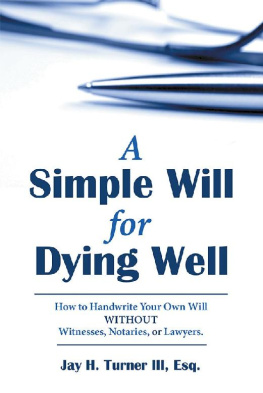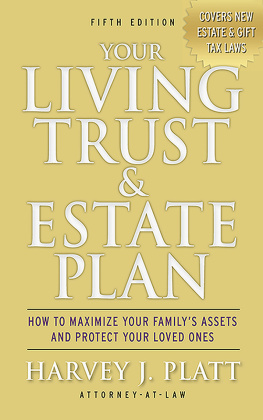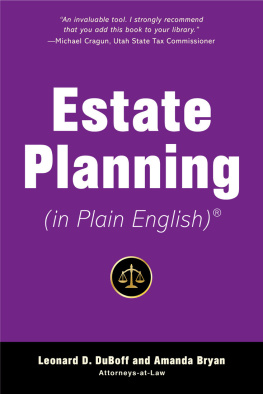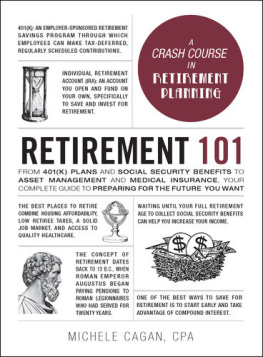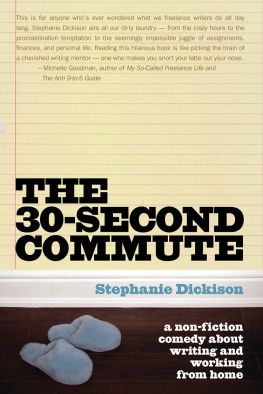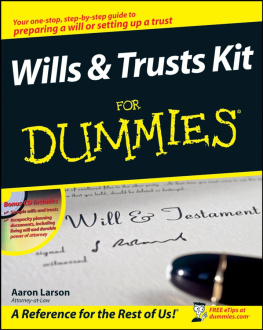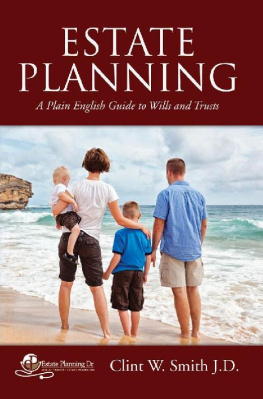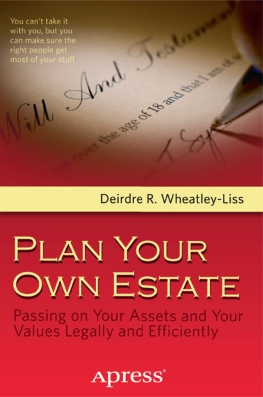A
Simple Will
for
Dying Well
How to Handwrite Your Own
Will WITHOUT Witnesses,
Notaries, or Lawyers.
Jay H. Turner III, Esq.

Copyright 2018 Jay H. Turner III, Esq.
All rights reserved. No part of this book may be used or reproduced by any means, graphic, electronic, or mechanical, including photocopying, recording, taping or by any information storage retrieval system without the written permission of the author except in the case of brief quotations embodied in critical articles and reviews.
The information, ideas, and suggestions in this book are not intended to render legal advice. Before following any suggestions contained in this book, you should consult your personal attorney. Neither the author nor the publisher shall be liable or responsible for any loss or damage allegedly arising as a consequence of your use or application of any information or suggestions in this book.
Archway Publishing
1663 Liberty Drive
Bloomington, IN 47403
www.archwaypublishing.com
1 (888) 242-5904
Because of the dynamic nature of the Internet, any web addresses or links contained in this book may have changed since publication and may no longer be valid. The views expressed in this work are solely those of the author and do not necessarily reflect the views of the publisher, and the publisher hereby disclaims any responsibility for them.
Any people depicted in stock imagery provided by Thinkstock are models, and such images are being used for illustrative purposes only.
Certain stock imagery Thinkstock.
ISBN: 978-1-4808-5711-7 (sc)
ISBN: 978-1-4808-5710-0 (hc)
ISBN: 978-1-4808-5712-4 (e)
Library of Congress Control Number: 2018900244
Archway Publishing rev. date: 01/12/2018
In this world nothing can be said to be certain, except death and taxes.
Benjamin Franklin
Dedication
To my children, Hugh, Helen and Bowen, who have taught me to love unconditionally.
Disclaimer
While best efforts have been used in writing this book, the publisher and author make no representations or warranties of any kind and assume no liabilities of any kind with respect to the accuracy or completeness of the contents and specifically disclaim any implied warranties of merchantability or fitness of use for a particular purpose. Neither the author nor the publisher shall be held liable or responsible to any person or entity with respect to any loss, incidental or consequential damages caused, or alleged to have been caused, directly or indirectly, by the information contained in or omitted by this book. By reading or using this book, you agree to this release of liability.
Although the author is a lawyer, reading this book does not create an attorney-client relationship between you and the author. This book provides a general review of estate planning issues, but should not be used as a substitute for the advice of a competent attorney admitted or authorized to practice in your state.
Contents
Chapter 1
Why Have a Will?
The only guarantees in life are an eventual death and, as Ben Franklin points out, the need to pay some taxes along the way. Despite the certainty of our own mortality, most people in America have not prepared a will. In a Gallup poll taken in 2016, only 44 percent of Americans reported having prepared a will. This is lower than in two prior Gallup polls: 51 percent in 2005 and 48 percent in 1990. According to the statistics, approximately 56 percent of Americans will die intestate (a legal term for without a will). Such people come from all income and socioeconomic levels. The recent death of the musician Prince is but one high-profile example of a person with significant assets who died without a will. In Princes case, the lack of a will opened the door for numerous heirs claiming to be his wife, child, sibling, and other distant relatives. Without a will identifying beneficiaries, his estate will undoubtedly incur additional and significant legal costs addressing these claims.
The statistics are discouraging, and they mean that most families will, at some point, administer an intestate estate. When a person dies without a will, the state laws of his or her residence determine who inherits the estate assets. The people who inherit are referred to as the heirs at law. The heirs at law generally start with the closest living relatives and then move out along family lines. Sometimes this arrangement works fine, but other times not.
It would be interesting to do a survey of Americans who would be willing to let their state government mandate exactly how they could spend their money during their lifetimes. I suspect the number who would be willing to do that would be very small. But by dying without a will, such individuals are doing just that: allowing the state to determine to whom their assets pass at death. Moreover, these estates are significantly more difficult and expensive to administer than when a decedent prepared a will.
One common worry is that if a person dies without a will, the state will take that persons assets. Although this result is unlikely, it is possible, depending on state law and whether the person left behind any close surviving relatives. Even if there are living heirs at law, such heirs may not be the beneficiaries that the decedent intended to benefit. There are several common scenarios that result in unintended inheritance situations.
- Multiple marriages . If the surviving spouse is not the mother or father of all of the decedents children, many states require that part of the estate pass immediately to the children. Logically, this makes sense. If the surviving spouse inherited everything, then there is a good chance that his or her stepchildthe decedents childwould not later inherit anything. This is a good law if you are a child but not a great law if you are the surviving spouse. For example, I handled an estate where the wife died unexpectedly without preparing a will. The wife had two children from a prior marriage, and under state law, all of her assets, including her house, were divided between her second husband and her two children. At her death, her husband and children then became co-owners of the family home, and no matter how good the relationship between children and stepparents are, no spouse wants to lose the exclusive right to live in the family home.
- Underage beneficiaries . Without a will, a parent cannot make any provisions for a minor child. When a minor child inherits assets under state law, that child will normally gain full access to those assets upon reaching the age of majority (typically age eighteen). I witnessed an eighteen-year-old inherit a large sum of money, and instead of going back to college, the newly rich adult embarked on other plans for his time and money. This resulted in tragic, life-altering, bad decisions on his part. A far better result might have come about if someone had been named to hold the assets on the childs behalf until he reached a more appropriate age. The will is also the document in which parents nominate guardians for minor children. Without a will, the court must decide who takes custody of minor children, which can result in fights over who takes possession of the children.
- Nonheir beneficiaries . Without a will, a fianc, stepchild, or other person you may intend to treat as family will not inherit under the intestacy statutes. For example, if you wanted to leave assets to your best friend, it is very unlikely that your friend would inherit anything under your state intestacy laws.
- Lack of control . Without a will, you give up the right to appoint the person who will administer your estate (known as the executor). This opens the gates for various persons (possibly including creditors) to seek appointment and control the disposition of your estate.
Next page
